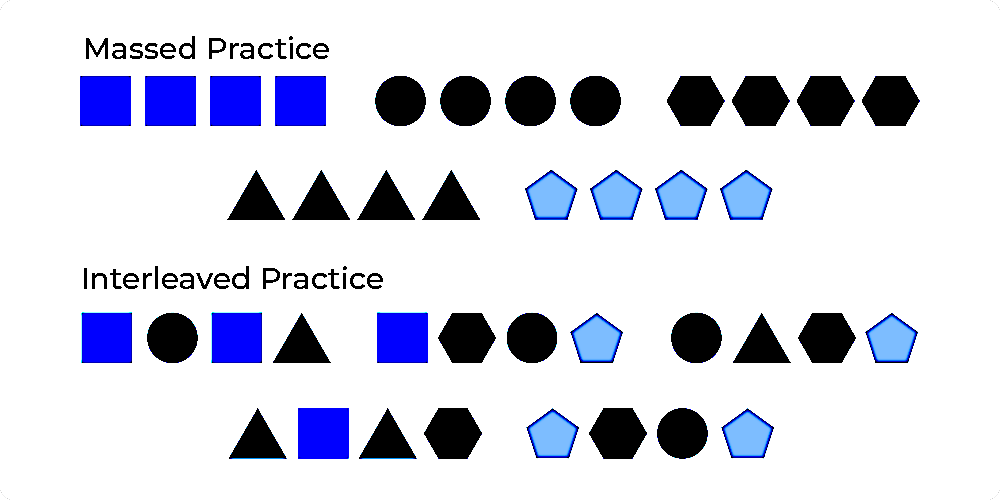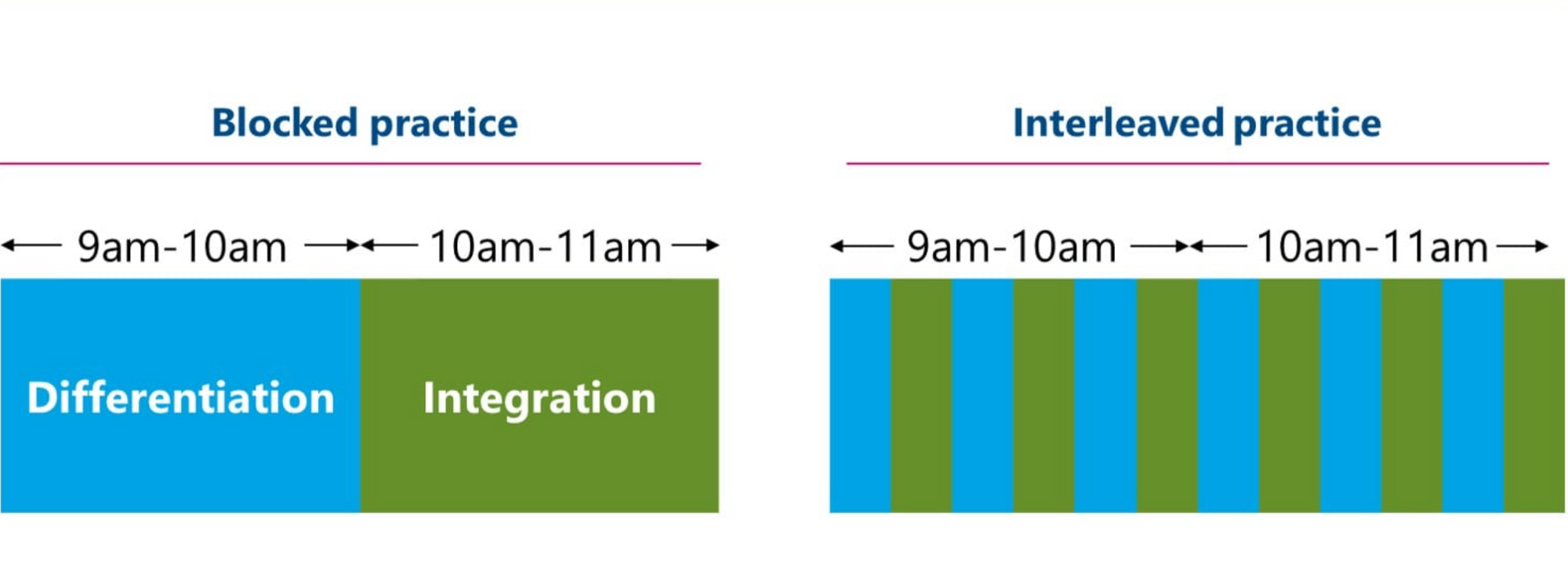Interleaving: Boost Learning By Mixing Your Studying
What if I told you that this isn't actually the best way to learn and the way you've been studying might actually be completely wrong?
The whole education system structures learning so that you study topic A, then topic B and then topic C. Pick up a textbook, attend a lecture or sit down to learn pretty much anything and you'll likely be learning in blocks.
When I was in medical school I read the book Make It Stick and it completely changed how I approached studying. Instead of using traditional ways to prepare for exams like re-reading book chapters and taking loads of notes the book highlighted evidence-based approaches to studying. When I started using techniques like active recall my exam scores went through the roof and I went from bottom of the class to the top while spending less time revising. Now when I was practising active recall questions I noticed that if I read a chapter and then did some recall questions on that chapter straight away I found those questions pretty easy because I'd recently read the material but if I tested myself again the following day a lot of the information I'd practised actually hadn't stuck that well.
-4.png)
For us to say we've truly learned something we need to commit it to our long term memory and then be able to apply it and this takes effort, which is why self-testing is so important. If things become too easy we aren't learning that efficiently. Just like how your muscles won't grow if you lift very light weights.
The problem with learning in blocks is that when we test ourselves on information we've just covered the information is still fresh in our minds and so we're using our short-term memory rather than testing out long-term memory and deeper recall ability.
This is where something called interleaving comes in. So in this video I'm going to cover what interleaving is, some of the evidence behind it and some strategies to help you integrate it into your own studying schedule to get better grades. So hit that subscribe button and let's get into it.
What is Interleaving?
So interleaving is a learning strategy that involves mixing up different topics or methods within a study session. For example, if you were studying math, you might interleave your study session by working on problems from multiple chapters, or by alternating between different types of problems, such as solving equations and working with graphs.
The idea behind interleaving is that we do a little bit of one topic, and then a little bit of another topic, and a little bit of a third topic, and then back to the first rather than do three hours of one topic, three hours of Topic 2, and three hours of Topic 3 or whatever your timing ends up being. There's lots of evidence that interleaving improves retention when it comes to studying for exams, but also learning anything in general. The book Make it Stick talks about a famous hockey coach who gets his players to do hockey drills and then just as they're getting the hang of those drills, he switches them onto a different exercise. The players have to work a bit harder and they don't like it because just as they're approaching mastering a drill the coach moves them onto something else. But they get results and the team ends up winning loads of games. The players are then happy in hindsight because they recognize that actually, it's only when stuff is difficult, that they're learning it deeply.
The Benefits of Interleaving
Now, why would you want to do this for studying? Well, there are a few benefits to using interleaving when studying. One of the biggest benefits is that it forces you to actively recall information from previous study sessions. This is because when you interleave studying, you are regularly switching between different topics, which means that you have to continually retrieve information from your memory. This retrieval practice helps to strengthen our memory and improve our overall understanding of the material.
Another benefit of interleaving is that it can help you to avoid the so-called "blocking" effect. The blocking effect occurs when you study one topic for an extended period of time, and then switch to a new topic. In this situation, it can be difficult to remember the information from the first topic, because your brain has become "blocked" by the new information. Interleaving can help to prevent this by regularly switching between topics, which keeps your brain from getting "blocked" by any one topic. Equally if you don't compare and contrast topics similar topics can seem confusing if you encounter them in isolation and don't dive into their differences.

Experts of Cognitive Psychology believe that interleaving improves the brain’s ability to differentiate between concepts and strengthens memory associations.
What Does Research Say About Interleaving?
Lots of research studies have shown that we learn better when we're repeatedly exposed to different interleaved concepts, rather than blocked ones. Roher in 2012 examined the effect of interleaving on the performance of students. He found that students who were taught using interleaving outperformed those who were taught using blocked practice.
Another study conducted by Kornell & Bjork in 2013, focused on student exam performance. The researchers compared three groups: Students who studied a single topic; students who studied two topics simultaneously; and students who studied two topics one after another. They found that students who studied two topics at the same time performed significantly better than those who studied only one topic even though the students found studying harder in the short term they did better on at the exam in the long term.
Roher also conducted a study in 2013 focusing on practical applications in mathematics. The study noted that most math assignments consist of a group of problems requiring the same strategy. For example, a lesson or book chapter on the quadratic formula is typically followed by a block of problems requiring students to use that formula, which means that students know the appropriate strategy before they read each problem as it's in their short-term memory. The study compared this traditional method of studying math with an alternative approach, where different kinds of problems appear in an interleaved order, requiring students to choose the best strategy on the basis of the problem itself. The study concluded that interleaving improves learning math not only by improving distinction between different kinds of problems, but also by strengthening the association between each kind of problem and its corresponding strategy.
-4.png)
How Does Interleaving Work?
All of the studies suggest that interleaving is an effective strategy for developing problem-solving and categorisation skills which are deeper levels of learning leading to enhanced long-term retention and increased ability to transmit learned knowledge.
The research suggests that interleaving works because it forces retrieval from our long term memory because each practice attempt is new, so rote responses used from short-term memory won’t help and in this way it's closely linked to why spacing and active recall are such powerful study techniques.
The theory behind this is that when we are blocking stuff like, for example, if we're doing math problems and we're doing lots of the same problem at once, just changing the numbers. Our brain starts to take shortcuts. It starts to realize, Oh, okay, that's the method and then it just starts applying that method to the subsequent questions. But if we're doing different sorts of problems that are all mixed up, our brain has to take that initial step of thinking, okay, what method do I have to use to solve this problem? The very fact that our brain requires that extra step means that we're more likely to perform better on the exam, when the exam is given later on.
In the research it's also thought that interleaved practise is an effective way to study due to something called contextual interference. An increased contextual interference, prompts you to use increased contrast between concepts and learning strategies, which helps you to notice the similarities, differences and connections between concepts more clearly. Interleaving different topics then also helps prevent the confusion that may arise from learning similar topics.
So let's look at how this is different from studying in blocks and then how to actually implement interleaving to learn more effectively.
How is Interleaving Different from Blocked Practice?

Mixing up and varying your studying is different from studying in blocks, which involves paying attention to just one type of practice or topic at a time.
Now I used to study in blocks and I think most people do because most books and lessons are structured that way as it's logical and makes sense to cover things one at a time in an A, then B, then C approach. So typically when studying or revising for an exam I'd do the same. I'd maybe block out an hour to do some recall questions on something like blood gas analysis where I'm using the same principles and equations and then I would go through explanations on the same topic and feel like I'd mastered it and then move on. Now this is good as I'm using active recall and better than just re-reading and not actively testing but it's not the best way to learn. Instead I might jump around testing myself on different areas of cardiology, not just blood gas analysis to make things a little harder. Because at the exam we don't usually a group of similar problems or clinical cases in a row everything is mixed together and we want to be revising and testing ourselves in a similar format to the final exam we'll be sitting. If I want to make things harder again I might bring in questions from different subjects like renal medicine too.
The main reason why interleaved practice helps memory formation is that it makes the brain work harder. When you are trying to learn something, your mind works hard to make sense of what you are trying to remember.
At a biological level our brain forms memories by creating new neural pathways and this is how information is stored in our long term memory. These pathways get stronger the more they are used.
When we are passively engaged in thinking about something we are not creating any new neural networks. We are just reusing old ones, our brains are taking shortcuts which is what happens when we study in blocks. Even if we are testing ourselves using active recall we use the same principles and strategies to solve the problems which is less effort. This means that our brains don’t get as many opportunities to create new neural networks. As a result, our brains become less efficient at storing memories. This is where interleaved studying comes into play. By constantly switching between different ways of thinking about the same thing, we're creating more neural networks. This allows our brains to create more connections and therefore store more memories.

How To Use Interleaving For Studying
So, how can you actually use interleaving in your studies?
Well you can interleave the topics you're revising, you can mix-up the type of questions you're testing yourself on and you can also mix up how you are learning.
For me I'll tend to choose different topics and spread them all through study sessions rather than blocking things out. According to educational psychologists in the studies mentioned earlier, this strategy is most effective when the topics are related in some way. For instance, in a study session, if I'm studying cardiac physiology and then spend a whole day reading about cardiac physiology, that's probably a sub-optimal way to learn. Instead it's way better to split my time up between cardiac physiology, cardiac anatomy and cardiac biochemistry. Maybe in the morning I'm going to start off with testing myself on ECGs and then I'll deliberately put in a hard stop and work on a bit of cardiac muscles and valve anatomy and then I'll revise a mixture of all cardiology questions to tie all of these topics together. Then I'll go into some renal medicine as it's different but related to blood pressure and the heart and then just as I've done an hour or so of renal, then I'll move on to the gastro and I'll try and mix up topics and active recall question types within that study session.
And this is where some people overcomplicate things. It's pretty easy to integrate interleaved practise but people get confused because they think they need to switch subjects all the time or just don't know where to start. If you have an existing study schedule it's fine to focus on a subject or topic area you need to improve upon in a study session. While you are blocking out your time to focus on an area you need to study, you're not studying using blocked practice as you're mixing the content topics and types of questions you're practising. You're not just doing 3 hours of revising French vocab on Quizlet you're mixing in grammar, maybe you're jumping into an audio lesson on Duolingo after 30 mins on Quizlet vocab and then maybe after an hour you switch to Spanish.
If you're preparing for medical finals or GCSEs or A-Levels in the UK, you'll likely have loads of subjects that you to prepare for. My technique for finals was to jump into question banks early and just randomize all the questions and work through the recall questions in a similar format to the final exam where you can get questions from any area in medicine. I was taking interleaving into account because that was around the time that I discovered this technique. If I just did recall questions on a single topic in a row or just read a book chapter and tested myself on that chapter alone I knew this was sub-optimal. Equally I'd also try and make sure the question types were mixed up too. So for finals you have some single best answer questions and then also extended matching questions and viva or oral questions like you'd get in an OSCE. So I'd also try and mix these up too spending a few hours doing random SBA and EMQ questions across the whole of medicine and then switching into OSCE style questions where I'd do those either online or with friends to mix up my method of studying.
If medicine isn't your subject here are a few other examples:
If you are studying for a history exam, you might interleave your study sessions by working on different time periods, such as ancient history, medieval history, and modern history rather than just one after another and you might switch between writing and learning essays and using flashcards to learn facts.
If you are studying for a math exam, you might mix up your study sessions by working on different topics, such as calculus, geometry and stats and mixing up the difficulty of questions and the types of questions you're practising.
If you are studying a language, you might practice vocabulary, grammar, and pronunciation together rather than in isolation and mix things up between language apps, listening to audio and reading comprehension.
So to wrap things up interleaving is a valuable learning strategy that can help you to improve your memory and understanding of pretty much any learning material and it's pretty easy to integrate but might make things feel a bit harder when you're studying which is actually a good thing. By regularly switching between different topics or methods, you can actively engage your brain and avoid the blocking effect to get better grades and learn faster.
-4.png)


